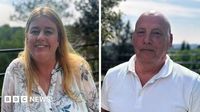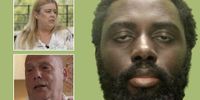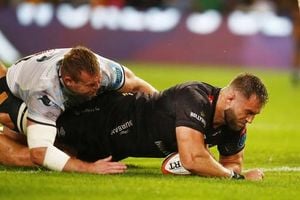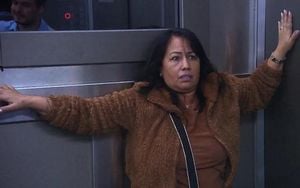On June 13, 2023, a tragic series of events unfolded in Nottingham, leaving a profound impact on the lives of survivors Sharon Miller and Wayne Birkett. The day began like any other for the pair, who were on their way to work when they were struck by a van driven by Valdo Calocane, who had just committed a horrific crime spree earlier that morning. The attack claimed the lives of two university students, Barnaby Webber and Grace O'Malley-Kumar, both just 19 years old, along with 65-year-old caretaker Ian Coates.
Sharon, 46, was commuting to her job as a cleaner at around 5:00 AM BST when she encountered Calocane's van on Market Street. "I saw the van, and the next minute I'm in the air," she recounted. "I thought I was dying - all I could see was white." The injuries she sustained were life-changing: a broken toe, five broken ribs, a lacerated spleen, and a serious leg infection that required extensive medical treatment.
Wayne, 61, was also caught in the chaos while heading to his job as a forklift driver. He was hit from behind and spent over six weeks in the hospital recovering from complex brain injuries and physical trauma. Unlike Sharon, Wayne has no recollection of the incident or any part of his life prior to that day. "My legs hurt all the time, my back hurts, I get headaches all the time, and it's horrible not having any memory and not remembering people you've known and worked for," he lamented.
Both survivors have expressed a deep sense of survivor's guilt, feeling that their lives were spared at the expense of the young victims. Sharon shared her feelings candidly: "When I heard what had happened to Barnaby or Grace, I thought, 'I wish he'd taken me instead of them.' They were so young and still had their lives ahead of them - you just feel so guilty." Wayne echoed her sentiments, stating, "I would have swapped my life for one of those poor students - without a doubt."
Calocane, who had been diagnosed with paranoid schizophrenia, was sentenced to a hospital order in January 2024 after admitting to three counts of manslaughter on the grounds of diminished responsibility and three counts of attempted murder. The decision to not convict him of murder has sparked outrage among the victims' families and the community. Sharon expressed her frustration, stating, "He should be in prison. He should have been forced to have had his medication."
In the wake of the incident, the case has prompted numerous reviews, including a mental health homicide review commissioned by NHS England. Earlier this year, both Sharon and Wayne, along with the families of the deceased, were invited to Downing Street to discuss plans for a judge-led public inquiry into the events surrounding the attacks. This inquiry is set to be chaired by Her Honour Deborah Taylor.
Wayne and Sharon are determined to ensure their voices are heard throughout this process. Their solicitor, Greg Almond, emphasized the importance of their participation, stating, "They want to put their story across and make sure they're not forgotten survivors." The inquiry aims to provide answers and lead to meaningful changes to prevent similar tragedies in the future.
Reflecting on their experiences, both survivors have faced significant challenges in their daily lives. Sharon has struggled with returning to work due to her injuries and now relies on a walking stick. She shared, "I'm still in a lot of pain with my leg and my back, but I'm getting there. Martin and my family, and my grandkids make me happy, but I don't like going out. I was never like that before."
Wayne, on the other hand, has had to relearn basic skills such as reading, writing, and even eating. He remarked, "It's horrible not having any memory. I feel lucky because the other two people he ran over saw what happened. He hit me from behind. I don't remember it." His partner Tracey has been instrumental in his recovery, caring for him since the attacks.
The emotional toll of the incident continues to weigh heavily on both Sharon and Wayne. They often reflect on the lives lost that day and the injustice of the situation. Sharon poignantly stated, "You should be able to go to work, and they should be able to walk around; Ian should have been able to get into his van and go to work. It's just so wrong."
As the public inquiry progresses, both survivors hope that it will not only shed light on the events of that fateful day but also lead to significant changes in how mental health issues are addressed in relation to public safety. They seek assurance that future tragedies can be prevented and that the memories of Barnaby, Grace, and Ian will be honored through meaningful action.
In sharing their stories, Sharon and Wayne aim to highlight the devastating impact of violence and the importance of community support in the aftermath of such tragedies. Their resilience in the face of adversity serves as a powerful reminder of the need for compassion and understanding in healing.






